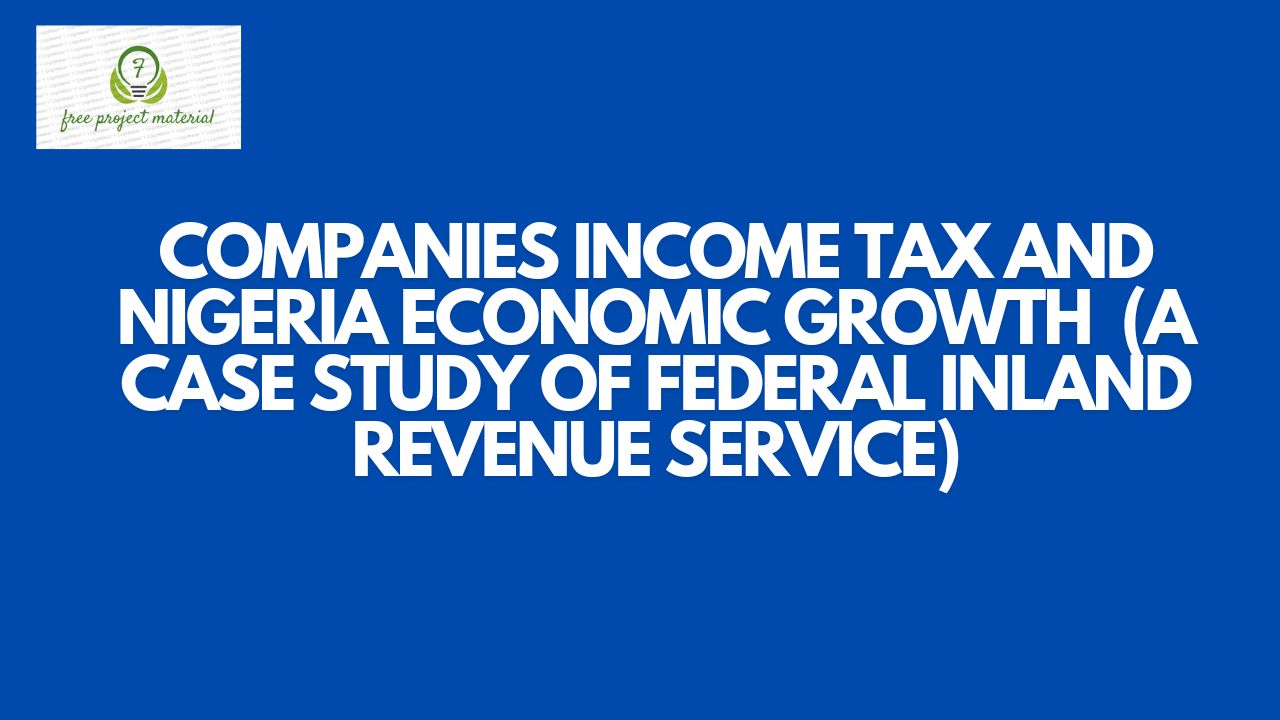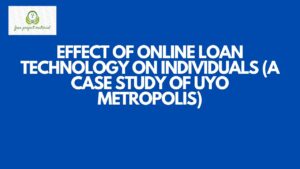ABSTRACT
This research is on companies income tax and Nigerian economic growth (a case study of Federal Inland Revenue) was aim at evaluating the influence of company income tax on Gross Domestic profit (GDP) of Nigeria for ten year ranged of 2013 – 2022. Primary and secondary method of data collection was use in gathering relevant data for this research work. The primary data adopted was questionnaire while the secondary was CBN statistical bulletin and National Bureau of statistics. Company income tax and GDP in Nigeria from 2013-2022. The researcher adopted survey research design which was descriptive and explanatory in nature. The statistical data use was a multiple linear regression to determine the dependent variable economic growth which is measured by GDP and the Independent variables companies income tax. The H0 was rejected which states that there is no significant contribution of companies income tax to Nigeria’s economic growth measured by GDP. A total of 27 questionnaire was administered, completed and returned. Findings from the study revealed that the aggregate influence of companies income tax on GDP are; revenue generation function to the government, assist the national government achieve the country’s macro-economic objective in the areas of fiscal and monetary policies, boost economic growth and boost economic development of the country. It was concluded in the study that companies income tax is key to economic growth of Nigeria. The researcher recommended that Government should carryout tax reform to boost companies income tax, to encourage domestic investors and foreign investors into the nation which would lead to companies income tax contributing to economic growth and development in Nigeria.
TABLE OF CONTENTS
Cover page
Fly Leaf
Title Page – – – – – – – – – i
Declaration – – – – – – – – – ii
Certification – – – – – – – – – iii
Dedication – – – – – – – – – iv
Acknowledgment – – – – – – – – v
Abstract – – – – – – – – – vi
List of Table – – – – – – – – – x
CHAPTER ONE
INTRODUCTION
1.1 Background of the Study – – – – – – 1
1.2 Statement of the Problem – – – – – – 3
1.3 Objective of the Study – – – – – – 5
1.4 Research Questions – – – – – – – 6
1.5 Research Hypothesis – – – – – – – 6
1.6 Significance of the Study – – – – – – 6
1.7 Scope and Limitations of the Study – – – – – 7
1.8 Organization of the Study – – – – – – 8
1.9 Operational Definition of key Concepts – – – – 8
CHAPTER TWO
REVIEW OF RELATED LITERATURE
2.1 Conceptual Review – – – – – – – 10
2.1.1 Overview of Company Income Tax in Nigeria – – – 10
2.1.2 Types of Taxes – – – – – – – 11
2.1.3 Problems of Taxation – – – – – – – 13
2.1.4 Some Principles of Good Taxation – – – – – 15
2.1.5 Administration of Companies Income Tax in Nigeria – – 16
2.1.6 Problems of Tax Administration in Nigeria – – – – 17
2.1.7 Solutions to the Problems of Tax administration in Nigeria – – 18
2.1.8 Contribution of companies Income Tax to Nigeria Economy – 19
2.1.9 Companies Income Tax Policies Reforms Framework – – 21
2.1.10 Concept of Economic growth – – – – – 23
2.1.11 Gross Domestic Products (GDP) – – – – – 27
2.1.12 Reasons for Imposition of Tax – – – – – 28
2.1.13 Functions of Taxation – – – – – – – 30
2.1.14 Nigeria Tax Laws – – – – – – – 31
2.1.15 Federal Board of Inland Revenue Services (FBIRS) – – – 35
2.2 Theoretical Framework – – – – – – 37
2.2.1 Economy Principle and Revenue Productivity Theory – – 37
2.2.2 The Benefit Theory – – – – – – – 38
2.2.3 The Ability to Pay Theory – – – – – – 38
2.3 Empirical Review – – – – – – – 39
2.4 Summary of Related Literature – – – – – 44
2.5 Research Gap – – – – – – – – 44
CHAPER THREE
METHODOLOGY
3.1 Design of the Study – – – – – – – 46
3.2 Area of the Study – – – – – – – 46
3.3 Population of the Study – – – – – – 46
3.4 Sample size and Sampling Technique – – – – 46
3.5 Source and Nature of Data – – – – – – 47
3.6 Method of Data Collection – – – – – – 47
3.7 Method of Data Collection – – – – – – 47
3.8 Theoretical Specification of Model – – – – – 47
3.9 Empirical Specification of Model – – – – – 48
3.10 Ethical Issues – – – – – – – – 48
CHAPTER FOUR
DATA PRESENTATION, ANALYSIS AND DISCUSSION OF FINDINGS
4.1 Presentation of Data – – – – – – – 49
4.2 Analysis of Data – – – – – – – 55
4.3 Discussion of Findings – – – – – – 57
CHAPTER FIVE
SUMMARY, CONCLUSION AND RECOMMENDATIONS
5.1 Summary – – – – – – – – 58
5.2 Conclusion – – – – – – – – 59
5.3 Recommendations – – – – – – – 59
5.4 Implication of Findings – – – – – – 60
5.5 Contribution of Knowledge – – – – – – 60
5.6 Suggestion for Further Studies – – – – – 60
References
Appendix
LIST OF TABLES
Table 4.1.1: Responses to Questionnaire Question One – – – 49
Table 4.1.2: Responses to Questionnaire Question One – – – 50
Table 4.1.3: Responses to Questionnaire Question three – – – 52
Table 4.1.4: Responses to Questionnaire Question Four – – – 53
Table 1: CIT and GDP from 2013-2022 – – – – – 55
Table 2: CIT and GDP from 2013-2022 – – – – – 55
Table 3: Regression Results – – – – – – – 57
CHAPTER ONE
INTRODUCTION
1.1 Background of the Study
Government all over the world undertakes huge public expenditures on behalf of their citizens such as the provision of infrastructure in form of roads, bridges, and social amenities. To meet up with these numerous wants and obligations, government requires substantial amount of funds. Such funds are usually generated from various sources, which usually include the imposition of government compulsory levies such as taxation. Taxation is defined as an amount of money paid to the government usually a percentage of personal income or company profit. Aguolu (2009) started that, taxation is the compulsory levy by government through the various agencies on the income, capital or consumption of its subjects. The Institute of Chartered Accountants of Nigeria (2006) viewed tax as an enforced contribution of money enacted pursuant to legislative authority. If there is no valid statute by which it is imposed; a change is not tax, Tax is assessed in accordance with some reasonable rule of apportionment on persons or property within tax jurisdiction. Sanni (2007) advocated tax as instrument of social engineering which can be used to stimulate general or special economic growth. Company income tax is a structure among the various tax structures in Nigerian company. Structures and categories of Nigeria Tax system are classified into direct and indirect tax (Aguolu, 2009).
Empirical studies have shown that the quantum of revenue available to any government needed to meet the social and capital expenditure in a country depends on its ability to harness funds from internal and external sources and channel it towards national development and economic prosperity. Appah (2010) found that revenue from taxation forms the bedrock of the revenue base of most governments all over the world. The extent to which a government can provide social, economic and infrastructural development is a function of the amount of funds at its disposal. Akinbobola (2021) opined that more taxes can be generated by government through reforming tax policies.
It has been observed that in Nigeria, the quantum of income generated from non-oil tax over the years by the federal government is grossly insufficient in relation to the ever increasing social, political and infrastructural developmental needs of the country. Odusola (2006) noted that Nigeria economy has thrived largely on oil revenue in the past three decades. In essence, Nigeria runs a monolithic economy which is subject to international oil price mechanism far beyond the control of the government, thereby exposing the economy to global market fluctuations, distorting budgetary projections, and renders meaningful developments improbable. The current budget of borrowing in Nigeria is a fall out of the dwindling oil revenue that has sank into abysmal low prices in the international market and has thrown the Nigeria budget for 2016 into serious crisis.
Appah (2010) further stated that the economic growth and development of any nation depends on the amount of revenue generated by the government for the provision of infrastructural facilities. The highway of economic growth of most developed nations of the world is paved with revenues derived from efficient taxation system (Enahoro & Olabisi, 2012). The provision of public services such as power, roads, efficient transportation system, healthcare facilities, schools, security of lives and properties and defence against internal and external aggression, are the exclusive responsibility of governments all over the world. According to Worlu and Emeka (2012), to meet these responsibilities, governments need to harness all sources of revenue available to it nationally and internationally. Reliance on external sources of revenue for developmental purposes has proved unproductive for many countries over the years, and those countries which experienced rapid social and infrastructural development around the world were found to have leveraged on revenue from efficient tax system. The Board of Inland Revenue administers the federally collected taxes through the Federal Inland Revenue Service (FIRS), while the board of state internal revenue service administers the taxes collectible by the state government and the revenue committee administers taxes and levies collectible by the Local governments (James & Moses, 2012). A good tax administrative system should have efficiency and effectiveness as its watch word. According to Kiabel and Nwoka (2009), the administration of tax is the responsibility of various tax authorities as established by relevant tax laws. However in Nigeria, the inefficiencies of tax administration as highlighted above have led to various tax issues. Abiola and Asiweh (2012) observed that those working in the informal sector of Nigerian economy do not see the need to pay tax whereas they dominate the economy leading to tax evasion and tax avoidance. From the above points, this study sets out to critically examine companies income tax and Nigerian’s economic growth (A case study of Federal Inland Revenue Service).
1.2 Statements of Problem
The major source of government revenue in Nigeria today is the proceeds from the sale of crude oil and gas in both local and international markets. As a matter of fact, this has been the situations in Nigeria for a long time. Unfortunately, the incomes generated by the federal government from other sources have not been in any way comparable to the oil revenue. This development has impacted negatively on the ability of the government to perform it constitutional, social and economic responsibilities. The dependence on the oil revenue is so much that other sources of revenue, like agriculture, manufacturing, exports and others have been neglected. At various times in the life of the country, there have been calls on the government to diversify the revenue base of the economy by exploiting other sources of revenue in order to promote economic development and reduce dependence on oil.
The inability of the Federal Inland Revenue Service Board to ensure total compliance to tax rules by companies and bring all operational companies into the tax net has significantly limited the contribution of tax revenue to economic growth. According to James and Moses (2012), the prevalence of tax evasion in the Nigeria tax system, has curtailed the amount of revenue collected from tax income, this in no doubt has effect on the government expenditure and inflation in the economy. Moreover, the revenue generation capacity of the nation’s present tax administrative system is hampered by challenges such as paucity of data, inefficient monitoring and enforcement system, and corrupt practices, as noted by Leyira et al. (2012).
In most countries, tax system is seen as an embodiment of contention and controversy whether in its policy formulation, legislation or administration as observed by (Bariyama & Gladson 2009). For example Nigeria government is contemplating to raise Value Added Tax rate, while the organised private sector is resisting that attempt and would rather have government bring more companies and individuals into the tax net as noted by (Alli, 2009). According to Enahoro and Olabisi (2012), there is a huge scale of corrupt practices prevalent in Nigeria tax administrative system, this tells to a reasonable extent that the economy is at a disadvantage position.
The problems associated with the major tax reforms in Nigeria can be attributed to its inability to achieve its set objectives towards which it was focused. Ogbonna and Ebimobowei (2012) identified some of the problems to include the increasing cost of tax administration by the Federal Government of Nigeria in relation to the tax revenue collections as evidenced by scholars, which is a major indication of high level of inefficiency in the tax operations of the country contrary to the canons of taxation enunciated by Adam Smith. Furthermore, the prevailing distortions in the tax system have jeopardized some of the purpose of the Nigerian tax reform agenda resulting in an ineffective tax system.
Companies Income Tax administration in Nigeria does not measure up to appropriate standards. If good old test of equity, certainty, convenience and administrative efficiency are applied, Nigeria will score low as a result of tax evasion and inadequate monitoring. Non-compliance with tax laws and regulations by tax payers is deep in the system because of weak control, poor tax administration, poor tax education, inconsistent government policies, lack of adequate statistical data and corruption among tax officials (Azubuike 2009).
1.3 Objectives of the Study
The main objective of this study is to examine the effect of companies income tax on economic growth in Nigeria from 2013-2022 fiscal years:
- To examine the effect of small company income tax on GDP of Nigeria
- To assess the influence medium company income tax on GDP of Nigeria
- To examine the impacts of large company income tax on economic growth of Nigeria
- To examine the aggregate influence of small companies, medium companies and large company income taxes on GDP.
1.4 Research Questions
These questions were praised to guide this study:
- What is the effect of small company income tax on GDP of Nigeria?
- What is the influence of medium company income tax on GDP of Nigeria?
- What is the impact of large company income tax on economic growth of Nigeria?
- What is the aggregate influence of small company, medium company and large company income taxes on GDP?
1.5 Research Hypothesis
The research hypothesis was stated as follows:
Ho: there is no significant contribution of companies income tax to Nigeria’s economic growth measured by GDP
Hi: There is contribution of between companies income tax to Nigeria’s economic growth measured by GDP.
1.6 Significance of the Study
The need to reduce the countries over dependence on the oil and gas revenue and the need to diversify the government revenue generation have made this research study unique. The relevance of this study therefore, stems from the fact that it is directed towards providing solutions to the problems identified earlier. The study would enables the federal government to know the present trend of revenue generated from companies’ income tax into the Federation Account, and how such performance can further be improved upon to enhance both economic and social growth. It will also pinpoint the aspect of the Companies’ Income Tax Act that needs amendment and how to formulate the necessary policies towards creating conducive environment for our limited liability companies in Nigeria. It shall further determine how the pursuits of government monetary and fiscal policies affect the companies’ performance whether positively or negatively.
The study also provides a holistic approach to tax administration in the country; therefore assisting the tax administrators by shedding light on existing loopholes that tax evaders explore. In addition, researchers and academic community would also draw inspiration from the in-depth analysis and articulation of the research work.
1.7 Scope and Limitations of the Study
The scope of this work is limited to company income tax and Nigerian economic growth and close preferences to the Federal Inland Revenue Service. This study was also limited due to time and financial constraints, pages ranged from 65-70 pages as well as data information mainly from Federal Inland Revenue Service.
1.8 Organization of the Study
This study is organized into five chapters. Chapter one is the Introduction and consisted of background of the study, statement of the problem, objectives of the study, research questions, research hypothesis, significance of the study, scope and limitations of the study, organization of the study and finally, operational definition of key terms. Chapter two was the review of related literature. Chapter three is the methodology adopted in the research. Chapter four was the data analysis of results computed by the researcher. Chapter five was findings, conclusion and recommendations as these were followed by implication of summary, contribution to knowledge and suggestions for further studies.
1.9 Operational Definition of Key Concepts
The following words are operationally defined as follows:
Companies Income Tax: This is an assessment levied by a government on the profits of a company.
Economic Growth: The rate of expansion in the volume of production of goods and services in an economy. It is the rate at which the Gross National Product (GNP) increases.
Nigeria Tax Authorities: This refers to the revenue collection agencies of the Federal Government of Nigeria represented by the Federal Inland Revenue Service (FIRS), State Internal Revenue Service (SIRS) and Local Government Revenue Committee.
Revenue: Implies resources or pool of funds available to the Federal Government of Nigeria from internal and external sources.
Tax Administration: Refers to tax management process and procedures for the effective and efficient transfer of financial resources from the private organisation to the public pool.
Tax Avoidance: This refers to the minimization of tax liability by tax payers through lawful methods. This is the legal usage of the tax regime to one’s own advantage to reduce the amount of tax that is payable by means that are within the law.
Tax Consultants: These are firms employed by the Federal Government of Nigeria charged with the duties of tax administration and collection.
Tax Evasion: This refers to the deliberate failure to pay taxes usually by making false reports. It is using illegal means to avoid paying taxes. Typically, tax evasion schemes involve an individual or corporation misrepresenting their income to the Inland Revenue Service.
Tax Reform Policies: These are policies established by the Federal Government in Nigeria on tax administration and implementation.
Tax: Obligatory transfer of financial resources from the private organisation to the public sector for common pool.



